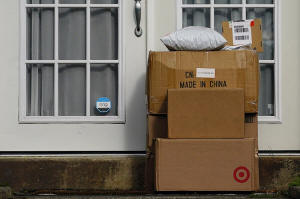Hong Kong to file complaint with WTO on US tariffs
 Send a link to a friend
Send a link to a friend
 [February 07, 2025] By
KANIS LEUNG [February 07, 2025] By
KANIS LEUNG
HONG KONG (AP) — Hong Kong will file a complaint against new U.S.
tariffs on the southern Chinese city's products with the World Trade
Organization, its government said on Friday.
The U.S. imposed an additional 10% tariff on Chinese goods and ended a
customs exception that allowed small-value parcels to enter the U.S.
without paying tax.
The measures have already prompted China to request WTO dispute
consultations with the U.S., as well as announce retaliatory tariffs on
select American imports and an antitrust investigation into Google.
In a statement, the Hong Kong government slammed the U.S. measures as
“grossly inconsistent with the relevant WTO rules” and said they had
ignored the city's status as a separate customs territory. It urged the
U.S. to rectify its acts.
This is not the first time Hong Kong has taken its trade disputes with
the U.S. to the WTO. Hong Kong, a former British colony that returned to
Chinese rule in 1997, operates as a semi-autonomous city with separate
economic and social systems from mainland China.
During U.S. President Donald Trump's previous term, Hong Kong had
complained against the U.S. requirement for city-produced exports to be
labeled “Made in China”. In 2022, arbitrators at the WTO concluded that
the U.S. was out of line in requiring that products from Hong Kong be
labeled as such.

The WTO confirmed Tuesday it received notice of China’s request for
consultations with the U.S. regarding the tariffs imposed on Chinese
goods. The move sets off a 60-day period for the two sides to resolve
their differences, and if not, the case can be brought before a
three-judge panel at the Geneva-based trade body.
However, the WTO’s dispute-resolution process has been stymied in recent
years as multiple U.S. administrations blocked appointments of judges on
its appeals court.
Separately, Hong Kong's post office announced late Thursday it would
continue to suspend shipping items containing goods to the United States
until further notice, despite its American counterpart having reversed
its ban on packages from the city and other parts of China.
[to top of second column] |

Packages are seen stacked on the doorstep of a residence, Wednesday,
Oct. 27, 2021, in Upper Darby, Pa. (AP Photo/Matt Slocum, File)
 The Hong Kong government said in a
statement that Hongkong Post was in talks with the U.S. postal
administration but further clarification was still needed on certain
matters, including over a tariff. It reiterated its strong
disapproval over the U.S. imposition of additional duty on Hong Kong
products, urging the U.S. to take “urgent actions to rectify its
wrongdoing."
The U.S. post office had announced Tuesday that it would no longer
accept parcels from China, including Hong Kong. It reversed course
Wednesday but gave no reason, saying it would work with Customs and
Border Protection to implement a collection process for the new
tariffs to avoid delivery disruptions.
Although the ban was short-lived and the U-turn came within the same
day for those who live in Hong Kong time zone, it confused those who
wanted to post to the U.S. from the trading hub.
It also sparked concerns over the potential impact on online
shopping platforms like Shein and Temu, popular with younger
shoppers in the U.S. for cheap clothing and other products, usually
shipped directly from China.
Cheap, direct postal service helps these companies keep costs low,
as did the “de minimis” exemption that previously allowed shipments
to go tax-free if their value is under $800.
The U.S. imported about $427 billion worth of goods from China in
2023, according to the U.S. Census Bureau. Consumer electronics,
including cellphones, computers and other tech accessories, make up
the biggest import categories.
All contents © copyright 2025 Associated Press. All rights reserved
 |